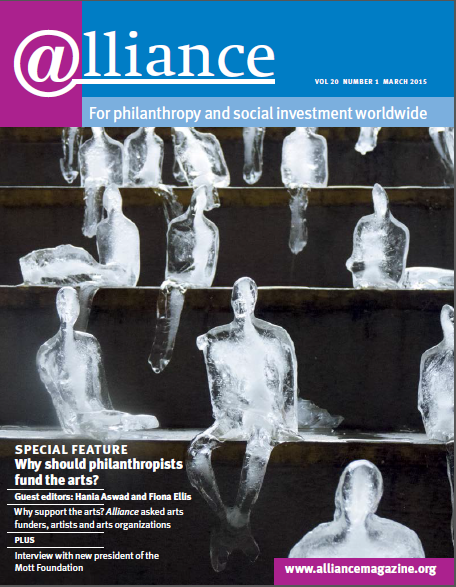It’s an old chestnut: should we fund art ‘for its own sake’ or to further some other end? Can we justify philanthropic funding for the arts when there are so many more urgent things to fund? A former director of India Foundation for the Arts is reputed to have said, ‘In India, there are 99 other things to fund before the arts.’ The title of the special feature, ‘Why should philanthropists fund the arts?’ suggests that justification is needed.
As more than one of our contributors have mentioned, the impetus for the special feature came from the Working Group on Philanthropy for Social Justice and Peace. Their investigation into the relationship of art and social justice had already resulted in Moukhtar Kocache’s paper Framing the Discourse, Advancing the Work: Philanthropy at the nexus of peace and social justice and arts and culture.
Here the work to be advanced is the pursuit of social justice. In his introduction, Kocache suggests that ‘the relationship between social justice and arts and culture is an uneven one’, his assumption being ‘that social change is the higher good and it is for other forms of endeavour to serve it’.
What has been so interesting to me, as the contributions for the special feature have come in, is how reluctant people are to take an instrumentalist view of art funding. Indeed Barry Knight, himself a Working Group member, suggests a reversal of the instrumentalist relationship between art and social justice, citing Keynes’ view that ‘art is the pinnacle of human achievement, and the goal of social justice is to enable human beings to reach it’. Knight sees art as ‘essentially transcendental’ while ‘social justice belongs in the material realm, concerned with practical issues of money, food, shelter, safety and relationships’. The conclusion he comes to is that an assessment of the value of art ‘should depend on the essential meaning of art itself, rather than on the attachment of a contingent purpose given to it by social activists’ – and that essence is creativity.
Although several contributors write about how they further their mission by supporting the arts, when explicitly asked ‘Why should philanthropists fund the arts?’ few were willing to give an instrumentalist answer. ‘In funding art, philanthropy funds our ongoing ability to define and shape our world,’ says Marion Potts of Malthouse Theatre in Australia. ‘The arts make us human,’ says Arundhati Ghosh of India Foundation for the Arts.
‘We don’t know if these grants will change the world,’ says Kathleen Cravero of the Oak Foundation. ‘We do know that they bring joy and beauty into the lives of children and families for whom both are in short supply. And that’s enough for us.’






Comments (1)
Apart from making us feel and resonate with each other in more human ways, creative and independent artistic practices are critical functions within liberal democratic processes. The products that emerge therefrom, including fresh insights and new ideas, are indispensable to keeping the mind's cultural plantations grow in context within organic and vital currents. It is the work of truly free artists, especially writers, that trigger paradigmatic shifts while functioning as seismographs for other power agents and players society.